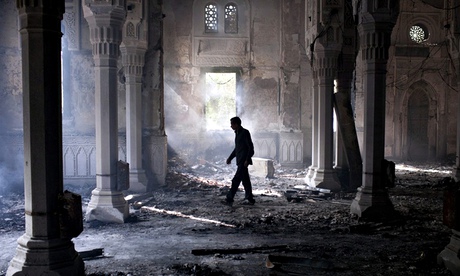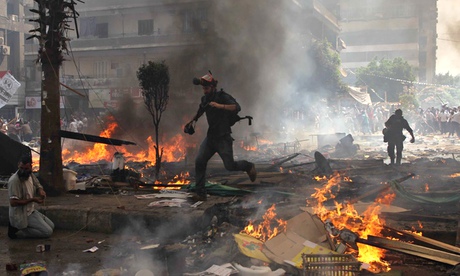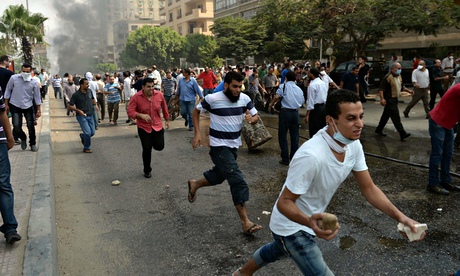Egypt's Rabaa massacre: one year on
The killing of 817 protesters last August was this week judged a crime against humanity equal to, or worse, than Tiananmen Square. But feelings on the ground are mixed

Destruction … the Rabaa al-Adawiya mosque, the morning after the massacre. Photograph: Ahmed Hayman/EPA
Patrick Kingsley
The Guardian, Saturday 16 August 2014
“To this day, I can’t believe it happened. I reached a point where I couldn’t talk to anyone. I couldn’t talk to my family. When people spoke to me, I just nodded.”
A year ago, Ahmed Husseini, an Egyptian student, lost seven of his best friends. Like many who survived the Rabaa massacre, he struggles with depression. He saw a psychologist for several months, but that didn’t help. Last month he ended his engagement because he felt even his fiancee could not understand what he had been through.
Images from the day still haunt him. He remembers watching a man’s intestines spill from his gut after he was shot. “This one isn’t such a big deal,” said a doctor, struggling to deal with even more serious cases. “Just try to squeeze his organs back in.”
The majority of the victims in the massacre, which took place on 14 August 2013, were supporters and members of the Muslim Brotherhood, which just six weeks earlier had been the most powerful political group in the land. One of their leaders, Mohamed Morsi, was Egypt’s first democratically elected president. But after a year in office, in which he was seen as increasingly undemocratic, millions of protesters called on the army to oust him – which it readily did.
Founded 86 years ago, the Muslim Brotherhood were the forefathers of political Islam, or Islamism, whose adherents believe in increasing the role of Islam within public life. Banned but tolerated under former Egyptian dictator Hosni Mubarak, the Brotherhood emerged as the strongest political force after Mubarak’s overthrow in 2011. In a highly religious country, many initially warmed to the Brotherhood’s apparent piety and history of social works and political opposition. Their support ebbed, however, once they won office, as voters gradually saw them as authoritarian, secretive and divisive, and perceived their religious project as a threat to the nature of the Egyptian state.
But not everyone agreed. As the protests against Morsi swelled, his backers gathered outside east Cairo’s Rabaa al-Adawiya mosque, which sat conveniently close to several Brotherhood properties, to show their man still had sizeable support of his own. A sprawling tent city emerged. Everyone knew it would eventually be cleared – the camp’s existence was an affront to the state’s authority. The question was whether the Brotherhood would agree to disband Rabaa voluntarily, in exchange for political concessions.
By the night of 13 August, it was clear that negotiations had failed. Most of the Brotherhood’s leaders left the camp that night, and the shooting began at around 7am the following morning. An hour into the attack, around 20 protesters lay dead. By the end of the day, there would be at least 627, according to state figures. Human Rights Watch says it documented at least 817, and suspects there may be more than 1,000. Some of the corpses were unrecognisable: the day ended with the burning of already-dead protesters until their bodies were charred black.
There were many in Egypt who felt the massacre was justified. The campers themselves believed they were campaigning to uphold democracy and the rule of law. Outsiders saw them as extremists who posed a threat to Egypt’s national security. “They are a group of terrorists and fascists,” Egypt’s best-known living novelist, Alaa al-Aswany, told the Guardian a few weeks later.
In fact, the vast majority of pro-Muslim Brotherhood protesters were unarmed, but there was a small group with guns who killed eight policemen while defending the camp that day. More damning were the dozens of retaliatory attacks on churches and police stations that alleged Brotherhood supporters carried out across the country as news of Rabaa began to trickle through to the provinces.

Reporters run for cover on 14 August, 2013, as security forces backed by bulldozers moved in on the protest camps at Rabaa. Photograph: Mosaab El-Shamy/AFP/Getty
Then there were the sectarian slogans – which many felt incited the subsequent church attacks – and aggressive speeches by former militants such as Assem Abdel Maged delivered from a stage erected outside the mosque.
These outbursts stoked the perception that the Brotherhood, sometimes portrayed in the west as the moderate face of political Islam, is in fact an incubator for more extremist brands of Islamism such as Isis or al-Qaida – a perception that led some to justify Rabaa’s violent dispersal, claiming it was the only way to defend against a similar wave of extremism in Egypt.
“People felt they were faced with a choice between Islamic extremism or keeping their country together in an authoritarian way,” says Khaled Dawoud, a liberal politician who opposed Morsi, but who also opposed the way Rabaa was cleared. “Even liberals and leftists – this is their serious belief. It’s about facing off extremist Islamist groups who believe in violence, like Da’ash [Isis] in Iraq and Syria.”
For ordinary Egyptians living in Cairo, the camp at Rabaa – which blocked off major thoroughfares – had become increasingly intimidating and disruptive. Waleed, a 31-year-old who lived in the middle-class suburb surrounding the camp, has no regrets about how it ended. “The real violation happened inside Rabaa during the sit-in – not during the dispersal,” says Waleed. “When you have a father who cannot attend chemotherapy because of a sit-in, that is a human rights violation. When you cannot go to the supermarket after 5pm, that is a human rights violation. When you have people getting kidnapped [an accusation levelled at the Rabaa protesters], that is a human rights violation.”
A frightening number of nominally liberal figures endorsed the massacre. But by no means all of them: the brutality of Rabaa’s clearance was what caused the collapse of the coalition between secular progressives and the institutions of the old Mubarak state, including the army, which had joined forces to depose the Brotherhood just weeks before. Mohamed ElBaradei, the new vice-president in the post-Morsi government, and one of the liberal figureheads of the 2011 revolution, resigned immediately, saying that violence would only lead to more violence. Khaled Dawoud, his party spokesman, resigned two days later. The fragile alliance between progressives and hardliners fell apart, and Egypt was left under the influence of army chief Abdel Fatah al-Sisi. What followed was a year-long crackdown on all voices of dissent with up to 36,000 political detainees jailed.
“It was definitely a point of divorce. It remains a defining point,” says Dawoud. “I don’t regret getting rid of Morsi – but this is definitely not the scenario that we hoped for.” Dawoud wasn’t happy about the killing of Brotherhood supporters during smaller confrontations earlier in the summer. But Rabaa was the final straw. “I felt that if I swallowed Rabaa, I was compromising all my principles about human rights. I would have to take whatever else came after – whatever killings, whatever bloodshed. And that’s not what I believe in.”

Muslim Brotherhood supporters running from police on 14 August 2013. Photograph: Khaled Desouki/AFP/Getty Images
The Brotherhood is still Egypt’s largest civil group, with hundreds of thousands of members, and an even wider net of sympathisers. But thanks to Rabaa and its aftermath, its strict hierarchy has been weakened, and its charity work all but ended. The majority of its upper ranks were arrested or fled in the days after Rabaa, and the group has become decentralised. Younger members have more autonomy, and female members of the group – for years denied an independent role – have been more active participants in street protests. “We’re against the arrests [of our leaders],” says Sarah Kamal, a twentysomething member, “but without leadership, we have space to think beyond the old routine.”
The group has been banned, and many of its assets seized – but this is unlikely to be the end for a group that has weathered several waves of oppression in its life-time. However, in order to stage a longterm revival, it must persuade ordinary Egyptians that it is not an extremist or militant group. Simultaneously, it must convince its own disenchanted fringes not to leave for genuinely extremist movements. Whether both competing challenges can be met remains to be seen.
But even if the Muslim Brotherhood can keep going, Rabaa’s survivors have been left with huge psychological scars. The state’s response to the massacre was not to prosecute the perpetrators but to widen the crackdown; the media’s has largely been to cheerlead what happened.
As a result, Ahmed Husseini speaks of a deep alienation from society. “My country has rejected me,” he says. “My country does not respect me as a human being.”
On Tuesday, this feeling was officially corroborated by a forensic, 195-page Human Rights Watch report that concluded the Rabaa massacre was a premeditated assault equal to, or worse, than China’s Tiananmen Square massacre in 1989. “This wasn’t a case of security forces pinpointing particular armed elements within the demonstration, and having collateral damage as a result,” says Omar Shakir, the HRW lawyer and researcher who wrote most of the report. “This was a plan that envisioned opening fire on crowds – tens of thousands of largely peaceful protesters – for hours on end without safe exit.”
Shakir’s report concludes that Rabaa was likely a crime against humanity, planned at the highest level of Egyptian government. “A crime against humanity,” says Shakir, is “a systematic, widespread attack on a civilian population as part of government policy. This is exactly what we saw in Rabaa square.”
But justice is not likely soon. HRW’s global director, Ken Roth, and regional chief, Sarah Leah Whitson, were deported from Egypt a day before they were due to announce their findings. The government and Egypt’s pliant media have denounced HRW in the days since.
“The legacy of the Rabaa massacre continues to cast a dark shadow over Egypt,” Roth later said. “Egypt will not move forward until it comes to terms with this bloody stain on its history.”
Additional reporting: Manu Abdo.
http://www.theguardian.com/world/2014/aug/16/rabaa-massacre-egypt-human-rights-watch